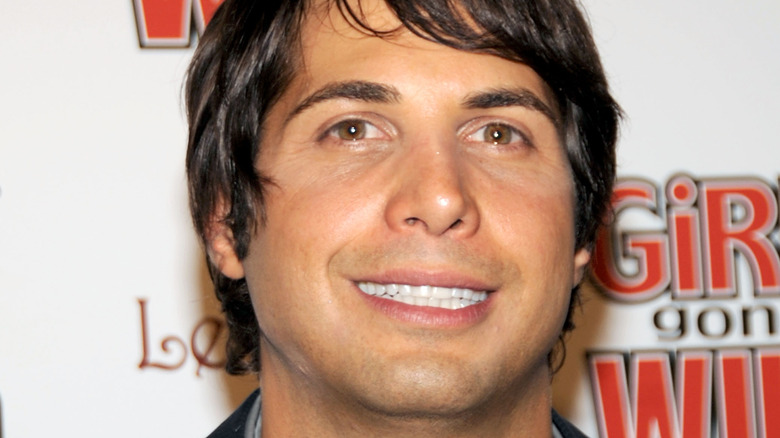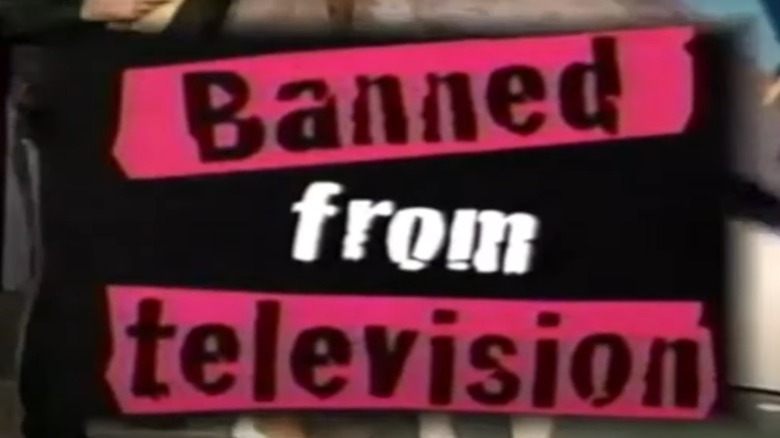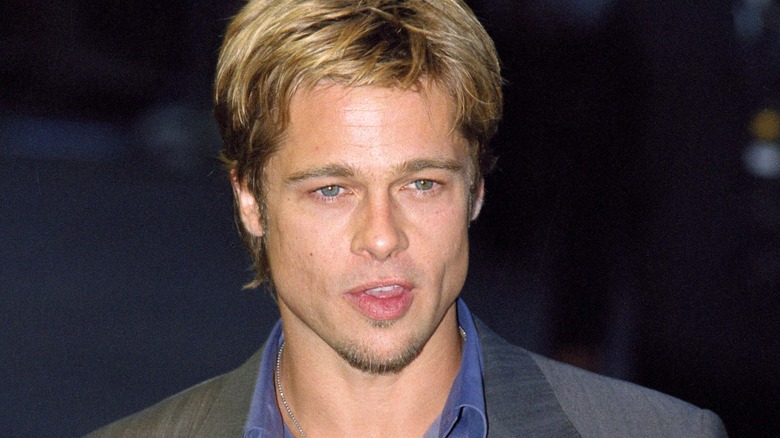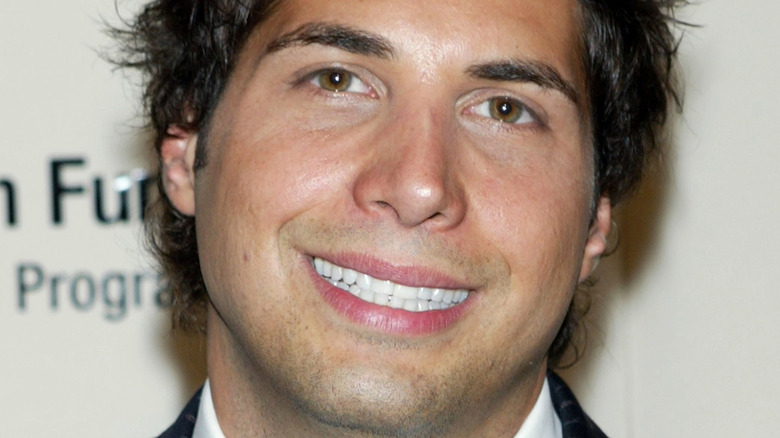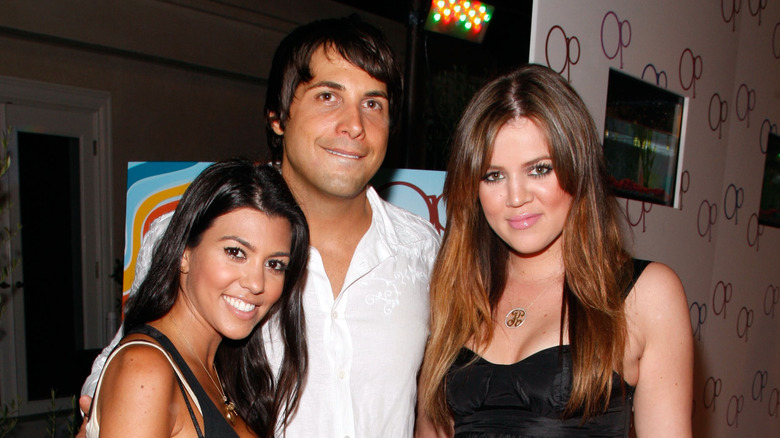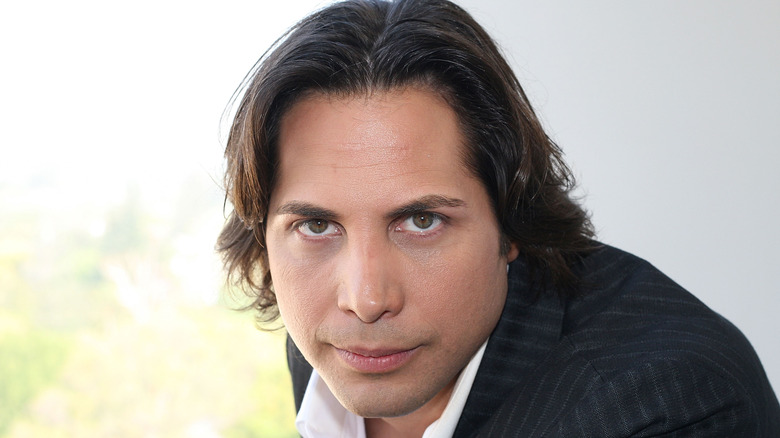The Sudden Rise And Fall Of Girls Gone Wild
If you ever watched television late at night in the late '90s or early aughts, the words "Girls Gone Wild" most likely have a very specific meaning for you. That was the period during which sleaze mogul Joe Francis used those three words to launch a surprisingly successful, shockingly resilient brand, anchored by a seemingly endless series of videotapes in which he and his intrepid crew of dude-heads traveled to the hottest party spots, video cameras in tow, in search of women who were inebriated enough to bare all for the camera for the pleasure of whoever was willing to pony up a nominal fee, plus shipping and handling, for a VHS tape or DVD.
The "Girls Gone Wild" brand raked in an obscene (no pun intended) amount of money for a heady few years, before the rise of all-you-can-consume internet pornography. As quickly as it rose, however, it fell perhaps even more quickly, and not just (to quote the illustrious Donald Glover) because the internet. Here's how Francis took "Girls Gone Wild" to the height of pop culture infamy, to the decidedly un-sexy environs of the courtroom, and finally to the dustbin of history.
The idea for Girls Gone Wild came from an even seedier project
According to the bio on Joe Francis' official website, the idea for "Girls Gone Wild" came about quite by accident. After graduating from USC in 1995, while trying to push a series of self-conceived "How to succeed at gambling" videotapes (a whole story in and of itself), Francis was working as a production assistant on "Real TV," an early reality series that, well, exploited lurid amateur videos for profit. A tape of outtakes began circulating among the staff which featured truly horrific, graphically violent material, which was a huge hit among the staffers (classy folks that they were). Smelling a sleazy opportunity, Francis scraped together all his cash and maxed out his credit cards, licensed the material, and used it to produce the first of three volumes of the infamous home video series "Banned from Television."
Of course, this material was not "banned," but rather, it was shunned, and for good reason. But since terrible people exist, Francis was able to use his college-acquired direct marketing skills to produce late-night infomercials which were able to find that awful niche. Unfortunately for him, though, sales began to plateau after those three volumes — because it turned out that, darn it, horrifying real-life murders and deaths just don't have a heck of a lot of rewatch value. But it was while searching for new footage for the series that Francis found something that did, at least among a certain audience: College women doffing their tops.
Girls Gone Wild was a direct marketing pioneer
It's interesting to imagine that a sleazy light bulb appeared over Joe Francis' head upon viewing his lurid footage, and he likely realized (unfortunately, correctly) that his direct marketing techniques would probably be a lot more effective selling videos of half-naked women than blood and guts. The first "Girls Gone Wild" infomercial debuted in the late '90s, but according to Variety, it wasn't until 2002 that the campaign really took off, with full 30-minute spots appearing in the wee hours of the night on otherwise respectable cable networks.
Francis offered an unsurprisingly crass take on why the "enter-mercials," as he referred to them, were so successful. "When you're flipping around, you want to see hot chicks," he explained, sleazily. "My original concept was I wanted to catch channel surfers. Every three or four seconds we feature a hot girl — and you're going to stop." Jennifer Varallo, vice president of media for Francis' company Mantra Entertainment at the time, chimed in to explain the spots' growing ubiquity, saying, "With each day, there's less fear of 'Girls Gone Wild.' We're pretty much everywhere and people know us at this point, so stations are foolish to pass on the revenue." She wasn't just whistling Dixie; at that time, actual, legitimate celebrities were beginning to show their affinity for the brand, and some would even participate in some of its videos.
Girls Gone Wild permeated pop culture at the height of its popularity
It may not come as a surprise that one iconic rapper, who has demonstrated a fondness for scantily-clad ladies, was among those seeking to score some cash and notoriety off the brand. None other than Snoop Dogg appeared as the host of one video, which would later land him in hot water after it came to light that some of the young ladies featured were underage, according to the Irish Examiner (another entire story in and of itself). Eminem, who loomed over all of pop culture at that point, had plans to follow suit, which he wisely thought better of (via Entertainment Weekly).
But aside from those who were willing to actually dip their toes into that filthy pool, there were a number of famous types who tacitly endorsed the brand, even by way of mere acknowledgement. In a 2004 New York Times article, it was noted that future megastar Brad Pitt had been captured by the paparazzi wearing a Girls Gone Wild trucker cap, and that Larry David had worked the videos into a storyline on his hit series "Curb Your Enthusiasm." Even '04 presidential candidate John Kerry, the last person whom one would expect to shout out the brand in any way, shape, or form, made a terrible joke about releasing a "Kerry Gone Wild" video in the midst of his campaign. Joe Francis, of course, was loving the attention. ”'Girls Gone Wild' is an entertainment franchise,” he told the Times. ”I want to put that name on everything I can.”
The company was sued a ton of times for increasingly terrible reasons
Even as Joe Francis was stating his lofty ambitions for "Girls Gone Wild," The New York Times noted that both he and Mantra were in a bit of legal trouble. The company was facing a complaint by the Federal Trade Commission alleging that customers had been charged for videos they never ordered; this would soon result in a $1.1 million settlement (via FTC.gov), a relative drop in the bucket. More serious were the charges Francis himself was dealing with out of Florida — one case involving the filming of underage girls, and another alleging that Francis had drugged and sexually assaulted a woman in Miami Beach.
According to The Hollywood Reporter, the case brought by the then-underage parties would result in a 300-day jail sentence for Francis, and this was just the beginning. Over the next several years, he would be sued for filming women without consent, targeted by the Department of Justice for tax evasion, and sued yet again for defamation by Las Vegas casino magnate Steve Wynn. That's a whole story to get into in a moment, but first — lest you think that Francis was being given a raw deal by the State of Florida and the DOJ — it's important to explain the truly awful way in which he allegedly capitalized when tragedy befell one of his favorite filming locales, the city of New Orleans.
Francis attempted some image rehabilitation on the back of a tragedy
As you are likely aware, Nawlins got punched right in the face in 2005 by Hurricane Katrina, which killed many (according to Five Thirty Eight, we still don't know just how many), displaced even more, and rendered the proud, historic city a disaster area for a very long time. As the Red Cross and other charitable agencies sprang into action, so did Joe Francis: As reported by CNN, he announced that a hundred percent of the proceeds from the "Girls Gone Wild" Mardi Gras-themed videos would be donated to assist in the relief efforts. It was a relatively successful bit of PR, drawing attention away from all those legal issues, if only briefly.
Of course, the very next year, it was widely reported (via The Guardian) that over $1 billion in Katrina relief funds had been misappropriated. While there was no evidence that Mantra was guilty of reneging on their charitable promise, there was evidence that a small amount of those disbursed funds — in particular, by one individual in Santa Monica (via the LA Times) — were actually used to purchase "Girls Gone Wild" videos, in a weird bit of sleazy serendipity. By this time, though, image rehabilitation had become the least of Francis' worries.
Francis made a bad gambling debt even worse
Despite all of his expensive legal problems, Joe Francis still had a soft spot for gambling — which brings us around to Mr. Steve Wynn, who was the CEO of Wynn Resorts in 2009. It was then that, according to TMZ, Francis racked up a $2 million gambling debt during a single weekend at one of Wynn's Las Vegas resorts. (Good thing those "How to Succeed at Gambling" videotapes never panned out.) Wynn hauled Francis into court over the debt, but in 2010, Francis attempted to drop a shocker — telling the judge, the press, and anyone else who would listen that Wynn had quite literally threatened to kill him.
This led to a different kind of lawsuit: one of the defamation variety, which dragged on until 2012. As reported by the Hollywood Reporter, a key witness in the proceedings was legendary music producer Quincy Jones, whom Francis insisted had relayed Wynn's threat to him; Jones, of course, stated under oath that this was malarkey. The jury ultimately ruled in Wynn's favor, and just like that, a $2 million dollar gambling debt turned into a $20 million judgment.
Francis was championed by Donald Trump and the Kardashians
In 2007, things got infinitely more sketchy for Joe Francis and Mantra, legally speaking. This is when, according to Forbes, the federal government took an interest in what appeared to be some creative bookkeeping by Francis' accountants, and filed charges alleging that Mantra had claimed about $20 million in deductions on its tax returns which it had not been entitled to. Also, they claimed that Francis himself had been squirreling away (and failing to report) money in offshore accounts. As the case played out, Francis pleaded ignorance, claiming that his CFO had masterminded a scheme to file false returns and turn him in to the IRS Whistleblower Program. The judge didn't buy it, and Francis eventually pled guilty, getting smacked with more jail time and millions in IRS liens.
In the middle of this, then-"Apprentice" host Donald Trump publicly stood up for Francis, calling him "a smart guy" and "a brilliant marketer" (big surprise), and he even invited Francis onto his show, an offer which was declined. Also among Francis' homies: the venerable Kardashian clan. Francis posed for a photo with Kris Jenner at Kim Kardashian's 2013 engagement party, and why not? It was he, after all, who advised Kim to "leak" the infamous sex tape that gave the Kardashians their celebrity status in the first place — even helping her broker her deal with Vivid Entertainment (via Complex), and appearing on the first season of "Keeping Up With the Kardashians."
The legal issues only got worse
Even with all the support from such famously upstanding public figures, Joe Francis couldn't seem to keep the legal troubles from snowballing — and while he could at least claim that the stories of filming without consent were all big fat lies, and that the tax evasion totally wasn't his fault (via Forbes), he had a much harder time excusing his own awful behavior. In 2013 (via NBC News), he was hauled into court yet again on allegations that, a couple years earlier, he had brought three women to his Bel Air mansion and basically held them captive there, physically attacking one of them; this netted him another 270 days in jail, which any reasonable person would opine may not have been enough.
Then, in 2015, he was brought up on charges of child abuse and prostitution stemming from those pesky underage filming allegations from back in the day (via Fox News). He was slapped with just shy of another year in jail, but he was released after being given credit for time served, as he had been sitting in the clink the entire time the charges were pending. To make matters worse for ol' Joe, Steve Wynn was still doggedly pursuing the money he had been awarded in the defamation suit (via Los Angeles Times) — and the only thing keeping him from seizing the assets of "Girls Gone Wild" was the fact that by this time, the company was in serious financial trouble.
Girls Gone Wild filed for bankruptcy in 2013
How serious was the financial trouble, you may ask? Well, in 2013, the company filed for Chapter 11 bankruptcy, in a move that was widely seen as being a strategic one to head off Steve Wynn's pursuit of financial satisfaction (via Los Angeles Times). Joe Francis, of course, attempted to paint the filing in the most positive possible terms. "Girls Gone Wild remains strong as a company and strong financially," the company reported in a statement. "The only reason Girls Gone Wild has elected to file for this reorganization is to re-structure its frivolous and burdensome legal affairs" (via ABC News).
Well, that, and to stave off Wynn — but that strategy only worked for so long. As reported by the Wall Street Journal, Wynn's lawyers called B.S. in spectacular fashion. "Francis has effectively evaded meaningful collection by making it appear that he has virtually no income or assets, despite his publicly lavish lifestyle," they said in a lawsuit filed that year. "Francis claims to know nothing about his finances, despite living a luxurious lifestyle that includes living in a multi-million dollar home in Bel Air, regular use of a multi-million dollar estate in Mexico, while regularly being seen at expensive restaurants and clubs." About that Bel Air mansion: It was eventually seized by the DOJ, who sold it at auction to ... Wynn, who promptly passed it off to Kuwaiti billionaire Bassam Alghanim for a tidy profit, according to Variety (via Yahoo! News).
A documentary shed light on Francis and his company's abuses
In 2014, "Girls Gone Wild" was sold to Liquidity Capital under a deal approved by Joe Francis' bankruptcy judge (via Wall Street Journal), and the brand continues to limp along on the seedier parts of the internet. According to The Sun, Francis permanently relocated to Mexico — where he has unsurprisingly gotten into more shady trouble — but in the U.S., he is all but forgotten. Well, he was, until a television documentary blew the lid off his entire ultra-sketchy history.
In 2022, TNT aired "Rich & Shameless: The Dark Side of the Girls Gone Wild Empire," which served as a greatest hits compilation of Francis' shadiness, and how he evaded serious consequences for all that exploitation of women, the non-payment of taxes, and countless other abuses over the years which, frankly, are too numerous to list here. As reported by The Guardian, special care was taken to call out Francis' celebrity enablers like the Kardashians, and to point out the humiliating reason why he wasn't ensnared in one of the most significant social movements of the last decade. "He slipped under the radar of the #MeToo movement, because he has been irrelevant for quite some time," said the documentary's director Katinka Blackford Newman. "Of course, his legacy lives on in the lives that he's ruined, the women whose images he stole, either by filming them without their permission, or getting them blind drunk and persuading them to take part in seedy sex scenes without payment."
